世纪商务英语写作训练Lesson1备课讲稿
- 格式:pptx
- 大小:745.43 KB
- 文档页数:36
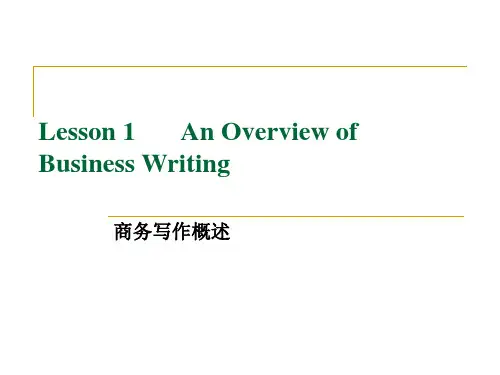
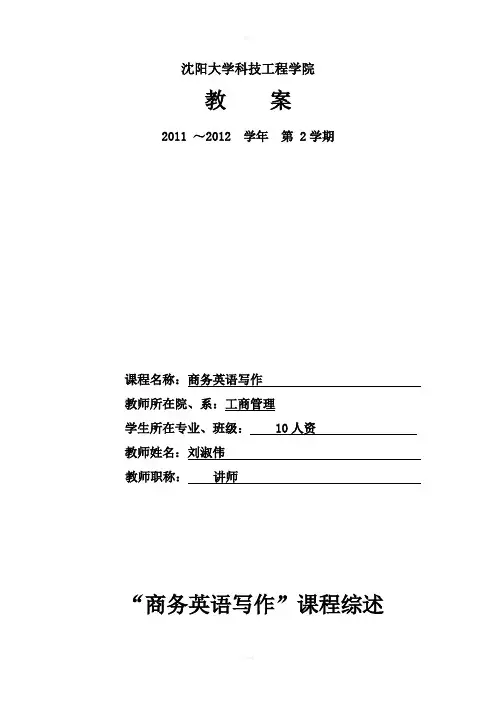
沈阳大学科技工程学院教案2011 ~2012 学年第 2学期课程名称:商务英语写作教师所在院、系:工商管理学生所在专业、班级: 10人资教师姓名:刘淑伟教师职称:讲师“商务英语写作”课程综述本课程的主要内容:本课程以商务英语写作技巧和能力训练为主要内容,把商务工作中可能遇到的各种写作任务融为一体,突出商务写作的特点,强调通俗易懂、简明完整、清楚正确的写作风格和原则,并尽量反映英美国家商务写作方面的最新内容。
本门课分为5大模块:商务英语写作基础、招聘与就业、企业办公管理、企业宣传和企业对外交流等,涵盖了商务基本写作类型,涉及到常用的备忘录写作、电子邮件、企业宣传、商务演讲和商务报告写作等,并有针对性的讲解简历,求职信及商业演讲等内容,将写作知识、写作技能与实际的业务活动有机结合,为学生提供了大量的写作范本,写作技巧和实战训练机会。
为了激发学生自主学习的积极性和加强学生实际应用能力的训练,本课程的每个单元设有4个板块:Having a Clear Picture(摸清门道)、Showing Your Talent Slightly (初露锋芒)、Opening the Treasure Box (打开百宝箱)、Displaying Your Prowess Fully (大显身手)。
课程以课堂讲授法和课堂训练法为主,辅以案例分析法,讲练结合,各个教学环节注重介绍写作的各种语境处理技巧,并结合课堂实践重点进行分析,加强学生的语言解析力。
能有效地提高学生商务英语写作能力。
本课程与其他课程的关系:商务英语写作课程的先修课程为英语专业基础课程和国际贸易实务、人力资源管理等相关专业课程,后续课程为经贸英语翻译等课程。
本课程总学时(学分)数:总学时48学时,学分3分。
本课程的考核方式:无期末考试总成绩构成(1)上交项目作业(每堂课根据情况选择抽交),包括电子版和纸质版,5次,每个占总分比例10%,合计占50%。
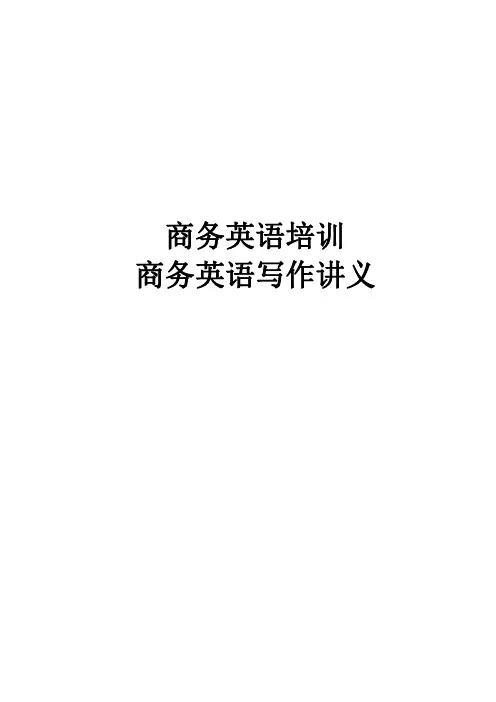
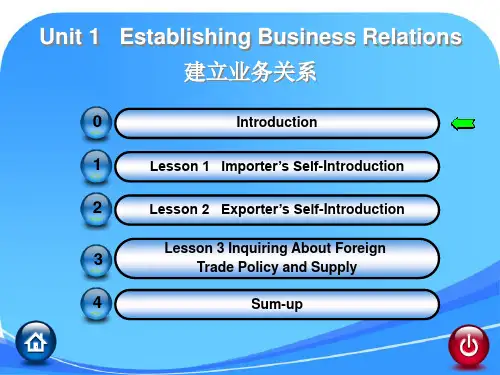
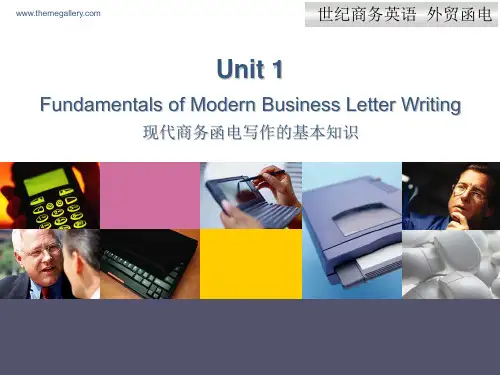

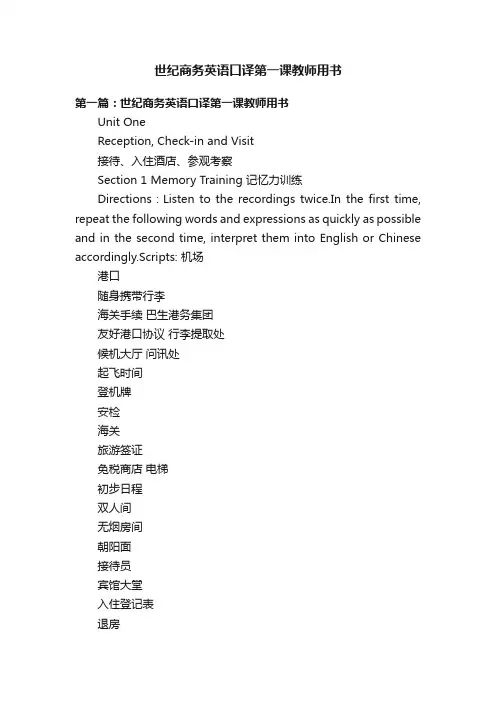
世纪商务英语口译第一课教师用书第一篇:世纪商务英语口译第一课教师用书Unit OneReception, Check-in and Visit接待、入住酒店、参观考察Section 1 Memory Training 记忆力训练Directions:Listen to the recordings twice.In the first time, repeat the following words and expressions as quickly as possible and in the second time, interpret them into English or Chinese accordingly.Scripts: 机场港口随身携带行李海关手续巴生港务集团友好港口协议行李提取处候机大厅问讯处起飞时间登机牌安检海关旅游签证免税商店电梯初步日程双人间无烟房间朝阳面接待员宾馆大堂入住登记表退房豪华套房五星级饭店用现金支付马拉松营销合伙企业竞争对手赞助商策略接管总部制作者目录代表团展览会流行服装投资潜在顾客经营范围供应商调研成交量商会single roomitineraryluxury suitecheck in to pay by casha tight schedulenon-smoking room the sunny side receptionist hotel lobby elevatordeparture timeinformation desk room chargeenquiry desk waiting hall luggage tag Sister Port Agreement luggage claim tourist visa terminal buildingboarding passsecurity check customsduty-free shopstar-grade hotel 40 percent discount hotel registration form to go through the registration proceduresinnovationperformance revenuesportswearchannelreference business associatemarket surveyChamber of CommerceDirections: Listen to the recordings twice.In the first time, retell each sentence as quickly as possible in the source language and in the second time, in the target language.Scripts: 1.我订一张去伦敦的票。



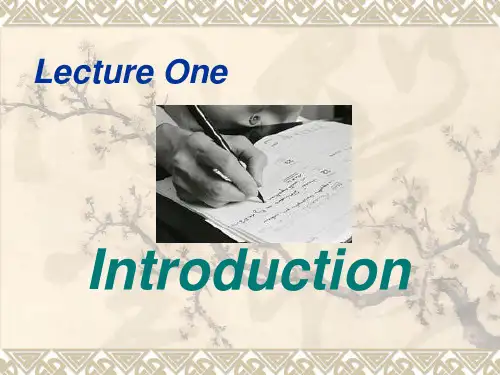
Unit 1 商务语言I. Related Background Information1. Alison ThomasAlison Thomas is a professional freelance writer based in Bristol, southwest England. She has written for a wide variety of magazines and newspapers, including national broadsheets. Her work covers a broad field, from personal finance to pottery, from diving to needlework. Her specialist areas are travel, languages, education and business.2. EurophoneEurophone USA, Inc. is a multi-faceted telecommunications company. Since 1991, Europhone has offered a comprehensive range of telecommunications products and services such as:◆Cellular Phones and Accessories◆Mobile partnered network-based communications services in the U.S. and Europe◆Prepaid Phone Cards◆GSM easy roam pre-paid phone cards◆Long Distance Service◆Internet Service Providers / Prepaid Internet Service◆Laptop ComputersEurophone has developed the Europhone Group of Companies (Inc.) with the following operating divisions: Northern Europe, Central Europe, Southern Europe, America, Asia Pacific, Group Products & Services, and Global platform & Internet Services.Europhone uses TDMA, CDMA, and GSM networks in various parts of the country and the globe to deliver high quality digital voice, messaging and data products. The focus is on leading the market through quality of speed and innovation.3. Confucius, Philosopher◆Born: 551 BC◆Birthplace: Lu, China (now Shandong Province)◆Died: 479 BC◆Best Known As: Chinese Sage◆Also Known As: Kong Fu-ZiConfucius was a teacher, scholar and minor political official whose commentary on Chinese literary classics developed into a pragmatic philosophy for daily life. Not strictly religious, the teachings of Confucius were a utilitarian approach to social harmony and defined moral obligations between individuals and social systems. After his death his pupils collected notes on his sayings and doings and recorded them as the Analects. This compilationwas added to over the years, and many sayings attributed to him are probably only loosely based on his teachings. His approach was formalized into a political and religious system during the Han Dynasty in the early part of the third century. It was embraced by subsequent generations and was the “state religion”of China until the latter part of the 20th century. In recent years critics have condemned Confucianism, characterizing its reliance on tradition as an impediment to modernization.“Confucius”is the Latin rendering of his Chinese name, Kong Fu-Zi, which is sometimes also spelled as Kung Fu-Zi, K’ung-fu-tze, or in other variations. The name is unrelated to the martial art known as kung fu.4. Korean languageOfficial language of North Korea and South Korea, spoken by more than 75 million people, including substantial communities of ethnic Koreans living elsewhere. Korean is not closely related to any other language, though a distant genetic kinship to Japanese is now thought probable by some scholars, and an even more remote relationship to the Altaic languages is possible. Korean was written with Chinese characters to stand in various ways for Korean meanings and sounds as early as the 12th century, though substantial documentation is not evident until the invention of a unique phonetic script for it in 1443. This script, now called Hangul, represents syllables by arranging simple symbols for each phoneme into a square form like that of a Chinese character. Grammatically, Korean has a basic subject-object-verb word order and places modifiers before the elements they modify.II. Language PointsText A1. English may be the language of international business but as Alison Thomas reports, it’s not only non-native speakers who need to learn how to use it effectively.本句是由连词but连接的并列句,后半句是强调句,强调主语non-native speakers。